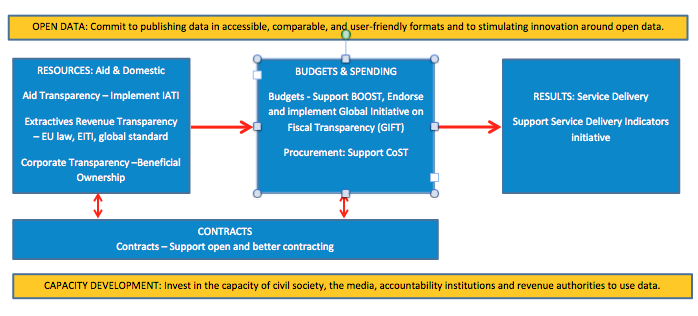Linking resources to results: A transparency narrative for the G8
[Guest post by Alan Hudson, ONE Director (Transparency & Accountability) – originally posted Feb 25th, 2013 on the ONE blog]
![]() As David Cameron’s speech to the World Economic Forum at Davos made clear, plans for the G8 Summit are taking shape. In addition to tackling the threat of extremism and terrorist violence, and addressing issues around agriculture, food and nutrition at a pre-G8 event, the key issues on the agenda are trade, tax and transparency – government transparency and corporate transparency.
As David Cameron’s speech to the World Economic Forum at Davos made clear, plans for the G8 Summit are taking shape. In addition to tackling the threat of extremism and terrorist violence, and addressing issues around agriculture, food and nutrition at a pre-G8 event, the key issues on the agenda are trade, tax and transparency – government transparency and corporate transparency.
On tax and transparency, a number of issues seem to be competing for attention on the G8 agenda. These include: transparency about the revenues that companies pay to governments to extract oil and other natural resources; transparency about land deals; transparency about tax matters; transparency about who owns and controls shell companies; transparency about budgets; and transparency about development assistance. Alongside these proposals are others to ensure that the information unleashed by various transparency initiatives is user-friendly and that civil society groups and others are able to make use of that information to hold governments and companies to account.
Faced with a plethora of proposals and initiatives, there is a need both for some prioritisation and for a clear and compelling narrative about how the various initiatives will work together to drive progress against poverty and preventable disease. For ONE, this is fundamentally a narrative about linking resources to results, with transparency and information the main storyline.

Here’s how the story might go.
On resources, the G8 countries commit: to make faster progress on implementing the International Aid Transparency Initiative (IATI) to meet their aid transparency commitments; to support robust EU laws on extractives transparency, help to develop a global standard on extractives transparency and, where relevant, sign up to the Extractive Industries Transparency Initiative (EITI); and, to establish public registries of beneficial ownership.
On budgets and spending, the G8 countries: support BOOST – a World Bank initiative to make information about budget revenues and expenditures more accessible; endorse and implement the principles of theGlobal Initiative for Fiscal Transparency; and, support the Construction Sector Transparency Initiative (CoST)so that there is transparency about how public resources are spent on infrastructure projects.
On results, the G8 countries support another World Bank initiative – the Service Delivery Indicators initiative – which looks to improve the information that is available about how health, education and other services are delivered in developing countries. Straddling the resources and budgets and spending categories, the G8 should also support better and more open contracting.
In addition to these asks at different stages of the chain from resources to results, we are also asking the G8 to take action to make the chain as a whole work better, first by making sure that data is made available in accordance with emerging standards for open data, and second by investing in the capacity of civil society, the media and other accountability institutions to use information to hold governments and companies to account.
This is an ambitious but achievable agenda. Backed by such a narrative, the G8 can deliver a coherent package of measures that, by enabling people to access information to hold their leaders to account, will help to ensure that all resources – aid and developing countries’ own resources – are used effectively to fight poverty, rather than squandered or siphoned away. This is a compelling story. We hope it’s one that the G8 will take up and use to communicate and deliver the policy changes that are needed.

